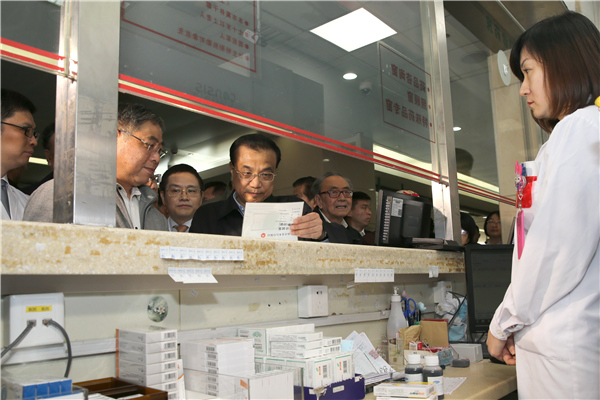
Premier Li Keqiang inspects Huashan Hospital in Shanghai on April 11.
Premier Li Keqiang pressed for further efforts to fully implement tax reductions as well as markdowns for anti-cancer drugs, while presiding over an executive meeting on June 20.
The executive meeting made a decision to further simplify approval procedures for imported drugs, implement markdowns for anti-cancer drugs, and strengthen work securing the supply of much-sought-after medicine, following an array of moves from a previous executive meeting in April to carry out zero-tariff treatment on anti-cancer drugs and facilitate importing new drugs.
Premier Li said that this urgent matter is associated with people’s well-being and the restructuring work regarding administration streamlining in the pharmaceutical industry. Therefore, all departments concerned should prioritize the issue and help make anti-cancer drugs widely available and affordable in China.
Streamline approval procedures for importing drugs
Conditional approval for a type of HPV vaccine by the State Drug Administration came hot on the heels of Premier Li’s requirement for speeding up the approval process, which is now eight days.
In the past, residents of the Chinese mainland had to travel to Hong Kong or countries in the vicinity to get vaccinated.
There was substantial dissatisfaction about this situation, as it not only affected people’s health but also the prospects of the whole country, the Premier said.
A decision was made at the meeting to put in place an orderly speed-up measure, allowing drugs already available in overseas markets to go public in China with simplified approval procedures.
Approval for drugs targeting rare diseases and certain drugs for treating life-threatening diseases will also be simplified. Integrated collection of research materials on pharmaceutical products will be accepted as application files, with the approval process concluding in three or six months.
Implement markdown measures immediately
Markdown measures for drugs are next in line after the already implemented zero-tariff treatment, and it will be the primary assignment for the recently reshuffled healthcare reform leading group.
It was decided at the meeting that authorities at all levels should carry out earmarked bidding and purchasing projects for anti-cancer drugs listed in the medical insurance inventory; drugs yet to be listed call for an accelerated negotiation for the medical insurance entry.
Additionally, pilot projects on national centralized medicine purchasing should come into play, in a bid to bring down the drug prices.
An alert system for precautions against drug supply shortages will be further beefed up, along with the establishment of a filing system for drugs either in short supply or rendered abolished. Drug reserves will be substantially enlarged to ensure patients’ dosages.
The ripples emanated by drugs that are rare or target rare diseases are felt far and wide in our society. This issue should sit on top of the government’s agenda, and an adequate supply of drugs should be guaranteed, the Premier said.
